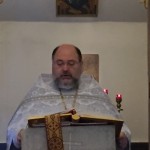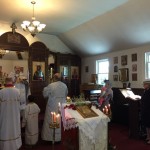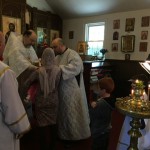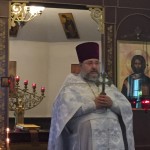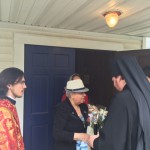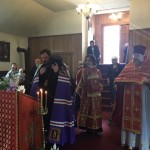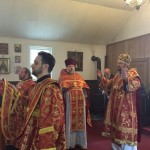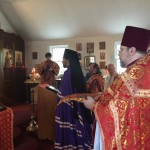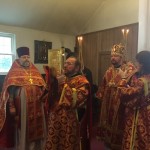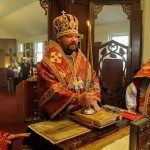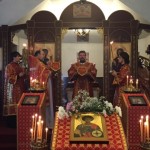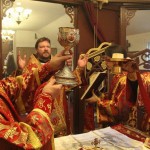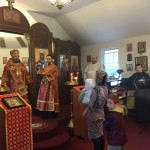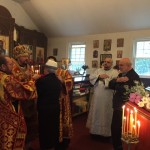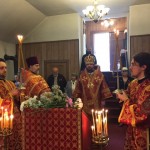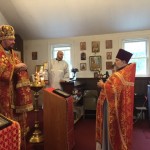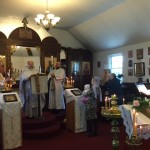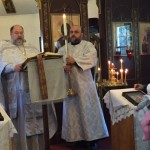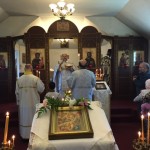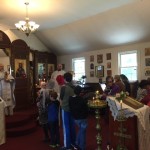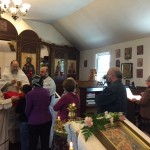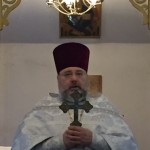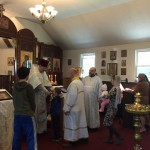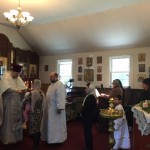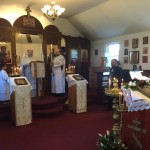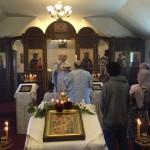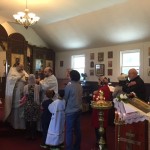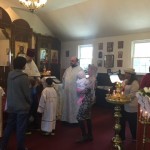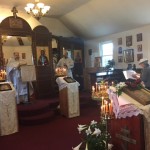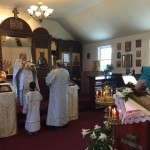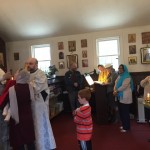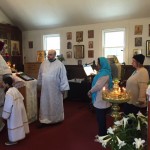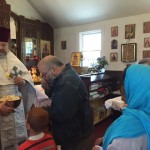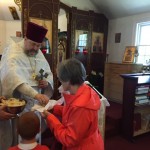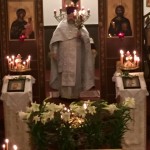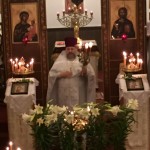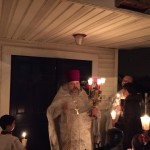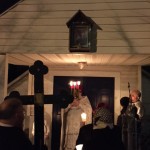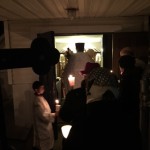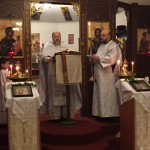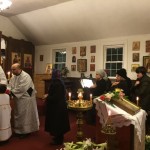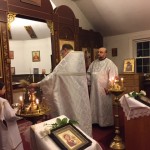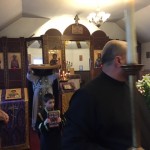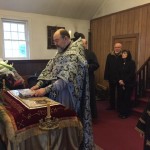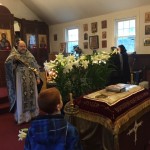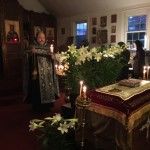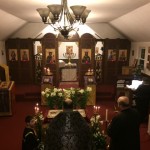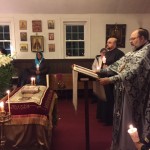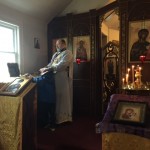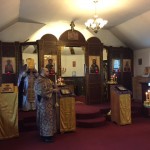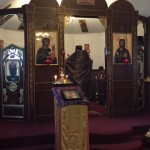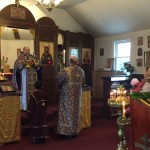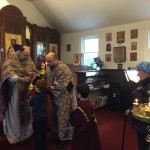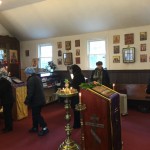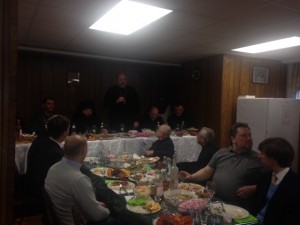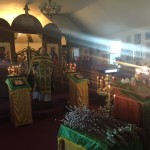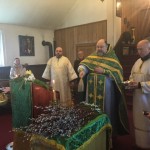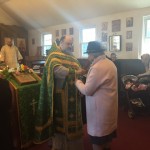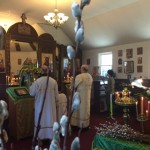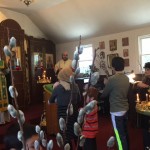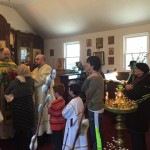On May 10, on the Sunday of the Samaritan Woman, St. George parish had a beautiful liturgical celebration. The Divine Liturgy was served by our Rector, Archpriest Igor Tarasov. Following the Gospel lesson he preached a homily in English:
“Today’s pretty long Gospel reading may give us a great number of ideas. Our Lord Jesus Christ discussed a number of things with the Samaritan woman beside the Jacob’s well. It would be interesting to note who are the Samaritans. These were people very close to the Jews, but they held a different belief. Although they worshiped the one and true God, they refused to honor the prophets and they recognized only the first five books of the Bible, the Law of Moses. They also claimed that the place of worship must be on Mt. Gorazin and not on Mt. Zion in Jerusalem. Thus the Jews considered them heretics and strangers. It should also be noted that Jesus in His conversation with the Samaritan woman does not change the Jewish opinion that Samaritans are in error. On the contrary He confirms that “salvation is of the Jews” (Jn. 4, 22). But the Lord offers both the Samaritans and the Jews a totally new approach to the faith which is His New Testament. They argued about the Old Testament and the Jews were correct in that argument, but the Son of God, the Messiah whom they both expected, came and now offered to them the new life, the new spirit, the living water.”
“Again we are speaking about the water in these days of the paschal celebration. Today’s Gospel tells us about the Jacob’s well. The wells were always important for the people as the sources of water. Especially in the Middle East, the wells and springs are significant because of their rarity in desert life. In the Scripture they often symbolize the life given by God. But the well mentioned today was primarily the source of the earthly life. Jesus, as a Man was tired and thirsty. He came to the well to get some water. In the course of the conversation with the Samaritan woman, Jesus tells her about another kind of water, a living water, that “Whoever drinks of the water I shall give him will never thirst” (Jn. 4, 14). The “living water” in the language of the Scripture means flowing water, a water from a spring rather from a pond or a cistern. In the spiritual sense it symbolizes true life from God, who is the Source of life.”
”The living water given by Jesus is the gift of the Holy Spirit which believers receive. And the Holy Spirit becomes a Fountain of water which flows with eternal life. Living water is true life from God. It is a life of faith in the New Testament of our Lord Jesus Christ rather than a water from the Jacob’s well, a spirit of the Old Testament. This is why it is a completely new spiritual reality. The Samaritan woman is bothered by the question where to worship God, on which mountain is the proper place of worship. The Lord tells her that “the hour is coming when you will neither on this mountain, nor in Jerusalem, worship the Father”(Jn. 4, 21). The idea of worship only at a specific place is going to give way to the understanding that worship must be in spirit and in truth. Upon the completion of His mission of salvation Jesus is going to bestow the Holy Spirit. In that Spirit the true believers will worship the Father. They will worship the Father also in truth. The truth is Jesus Christ Himself and His revelation.”
”Let us then desire to live according to our spiritual call of acquiring the living water given by our risen Lord Jesus Christ. Let us be worthy of the eternal life promised by our Savior. Let us also imitate the Samaritan woman in her thirst for spiritual things, in her readiness to accept the teaching of the Lord. We may be wondering who was that woman. The Scripture does not tell us her name. But the Tradition does and it says that her name was Photini which in Greek means ‘the light’, pertaining to the light. She became a follower of Christ and died a Martyr. The Church honors her as St. Photini. Therefore, let us imitate her not in her previous sinful life but in her readiness to follow Christ.”
“Dear brothers and sisters! Let us also worship the true God the Spirit in His spirit and His truth.”
After the Liturgy dismissal the Rector congratulated all our women and mothers on the occasion of Mother’s Day. Traditional Polychronion (“Mnogaia leta”) was sung.
The Rector also announced that a memorial service for all perished on the battle field during World War 2, as well for all killed or fallen asleep because of that war, will be celebrated shortly. Fr. Igor reminded parishioners that 70th Anniversary of the Victory in World War 2 was celebrated on May 8 (on May 9 in Russia). This is why, we as the Church should commemorate those who perished because of that terrible tragedy.
Further the Rector expressed his gratitude to our parishioners for their great efforts to prepare for the celebration of our Parish Patronal feast of St. George.
Following his speech the Rector served the Memorial service (Litia) for all those who perished during the World War 2, the soldiers at the battle fields, the civilians killed or tortured and all who fell asleep because of that war.

